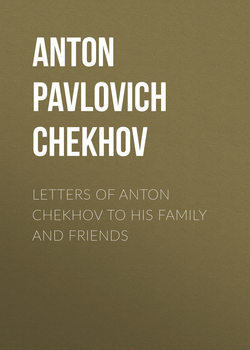Читать книгу Letters of Anton Chekhov to His Family and Friends - Антон Чехов, Anton Pavlovich Chekhov, Anton Czechow - Страница 22
LETTERS
RAGOZINA BALKA,
ОглавлениеApril 30, 1887.
It is April 30. The evening is warm. There are storm-clouds about, and so one cannot see a thing. The air is close and there is a smell of grass.
I am staying in the Ragozina Balka at K.‘s. There is a small house with a thatched roof, and barns made of flat stone. There are three rooms, with earthen floors, crooked ceilings, and windows that lift up and down instead of opening outwards… The walls are covered with rifles, pistols, sabres and whips. The chest of drawers and the window-sills are littered with cartridges, instruments for mending rifles, tins of gunpowder, and bags of shot. The furniture is lame and the veneer is coming off it. I have to sleep on a consumptive sofa, very hard, and not upholstered … Ash-trays and all such luxuries are not to be found within a radius of ten versts… The first necessaries are conspicuous by their absence, and one has in all weathers to slip out to the ravine, and one is warned to make sure there is not a viper or some other creature under the bushes.
The population consists of old K., his wife, Pyotr, a Cossack officer with broad red stripes on his trousers, Alyosha, Hahko (that is, Alexandr), Zoika, Ninka, the shepherd Nikita and the cook Akulina. There are immense numbers of dogs who are furiously spiteful and don’t let anyone pass them by day or by night. I have to go about under escort, or there will be one writer less in Russia… The most cursed of the dogs is Muhtar, an old cur on whose face dirty tow hangs instead of wool. He hates me and rushes at me with a roar every time I go out of the house.
Now about food. In the morning there is tea, eggs, ham and bacon fat. At midday, soup with goose, roast goose with pickled sloes, or a turkey, roast chicken, milk pudding, and sour milk. No vodka or pepper allowed. At five o’clock they make on a camp fire in the wood a porridge of millet and bacon fat. In the evening there is tea, ham, and all that has been left over from dinner.
The entertainments are: shooting bustards, making bonfires, going to Ivanovka, shooting at a mark, setting the dogs at one another, preparing gunpowder paste for fireworks, talking politics, building turrets of stone, etc.
The chief occupation is scientific farming, introduced by the youthful Cossack, who bought five roubles’ worth of works on agriculture. The most important part of this farming consists of wholesale slaughter, which does not cease for a single moment in the day. They kill sparrows, swallows, bumblebees, ants, magpies, crows – to prevent them eating bees; to prevent the bees from spoiling the blossom on the fruit-trees they kill bees, and to prevent the fruit-trees from exhausting the ground they cut down the fruit-trees. One gets thus a regular circle which, though somewhat original, is based on the latest data of science.
We retire at nine in the evening. Sleep is disturbed, for Belonozhkas and Muhtars howl in the yard and Tseter furiously barks in answer to them from under my sofa. I am awakened by shooting: my hosts shoot with rifles from the windows at some animal which does damage to their crops. To leave the house at night one has to call the Cossack, for otherwise the dogs would tear one to bits.
The weather is fine. The grass is tall and in blossom. I watch bees and men among whom I feel myself something like a Mikluha-Maklay. Last night there was a beautiful thunderstorm.
… The coal mines are not far off. To-morrow morning early I am going on a one-horse droshky to Ivanovka (twenty-three versts) to fetch my letters from the post.
… We eat turkeys’ eggs. Turkeys lay eggs in the wood on last year’s leaves. They kill hens, geese, pigs, etc., by shooting here. The shooting is incessant.
